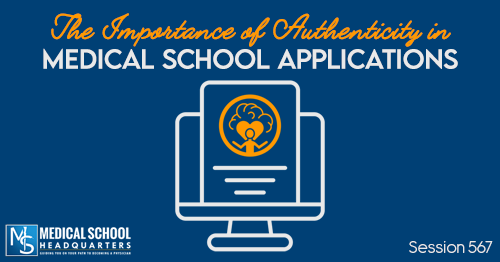Apple Podcasts | Google Podcasts

Session 367
Today’s episode is a special one as I’m sharing with you a talk I gave at the University of Florida for their AMSA Premed Club Meeting. I touch on topics like crafting your personal story, medical school interview tips, and more!
If you haven’t yet, be sure to check out all our other podcasts on the Meded Media.
Listen to this podcast episode with the player above, or keep reading for the highlights and takeaway points.
[03:00] Collaboration, Not Competition.
A lot of people can tell you that you can’t go to medical school or that you can’t get in because there are too many of you applying. In fact, I heard that spiel from a premed advisor, specifically in my Sophomore year. I never went to her again. Instead, I went to a group of premed students for support and advice.
'You're not competing against each other. Every day, you're only competing against yourself to get into medical school.'Click To TweetCollaborate with each other. There are enough seats to get into medical school for those of you who deserve it.
There are really terrible applicants out there and they shouldn’t be applying to medical school. So when you see those stats, they can really look dismal. You think you have to be a perfect student to get into medical school. But you don’t.
[06:00] Your Story Matters
You have to have a good enough GPA and good enough MCAT score. You also have to have your story. There are a lot of students with great scores but get zero interviews. Your grades are not an easy-in for medical school.
'You have to have your story.'Click To TweetThere are students out there with super great stats but zero shadowing experience and zero clinical experience. And they don’t get in.
Medical schools don’t want a perfect student. You can get a C in organic chemistry. Or you can get multiple withdrawals and still get into medical school. You don’t have to be a perfect applicant. But the story in your personal statement – secondary essays, and interviews – is what makes or breaks your application.
[09:25] If There’s a Will, There’s a Way
'If you want to go to medical school then you can!'Click To TweetYou may need to go and do a postbac. You may need to take some more classes after you graduate to prove to yourself and prove to medical schools that you are academically qualified to finish medical school.
Medical schools want to make sure that you’re academically capable of finishing medical school.
Medical school is hard. But you don’t have to be a genius to finish medical school. A lot of students struggle with grades but they still finished it. Why? Because they work hard. Medical school is a whole another level than undergrad.
Some students may need to do a special master’s program or master of science to improve their GPA. Some may even have to take the MCAT twice or four times.
I’ve talked to dozens of deans of medical school admission committee members and students who have kicked out of undergrad and have been arrested for various reasons. All of them have fought their way back to get into medical school.
If you failed your test last week and if you’re going to fail a test next week, or drop out a semester, understand that if this is what you want to do, then figure out a way to do it. It will be a part of your story when you’re applying to medical school.
'At the end of the day, everything you will have to go through will help you be a better physician.'Click To TweetThey want to see you’ve overcome the challenges you’ve had. Everyone has challenges they’ve overcome, whether big or small. What you’ve done with what you’ve been given in life is important. And this is your story!
[15:50] How to Write a Good Personal Statement
When you’re applying to medical school, think about your story not just from your stats, but from when you first realize that healthcare was something you’re interested in.
You could say you love science and you like to help people but that’s not a reason to be a physician. That is the base layer just like Maslow’s hierarchy of needs. But you have to build on that. You do that through shadowing experiences and clinical experiences.
'Figure out your story.'Click To TweetWhen it’s time to apply to medical school, everyone looks the same. You’ve all done things to work on your application What helps you stand apart is the way you’re able to tell your story.
Start thinking about what was about your experience that really confirmed or solidified in your mind that this is why you want to be a physician. The more you can tell that story, the better your application will be.
If there are bumps along the way – withdrawal, a couple of F’s, etc. – tell that story too because it matters.
If you’ve messed up and you have some issues in your application, own up to it.
[20:25] Own Up to Your Mistakes
If you’ve messed up and you have some issues in your application, own up to it. If you were caught cheating on a test, then own up to it. Don’t blame others for it. No matter what happens in this journey, go for it! Fix your mistakes, continue on, and don’t give up.
'If you have a mistake, own up to it.'Click To Tweet[22:05] Rejection Doesn’t Mean No
When I applied to the University of Colorado and got rejected, it felt like I was being told that I can’t be a doctor. But what was really being said to me is “not right now.” they invited me for an interview, but there were some things I needed to fix. So I fixed them and reapplied.
'Whether you're applying for a job or medical school or residency, when you get those no's, it's not a no but 'not right now.'Click To TweetKeep pushing forward and keep going down this journey because it’s ana amazing journey. Even though physicians are telling you it’s not worth it, trust me, it is. It’s a long path but enjoy it.
Enjoy your day every day. And things can get miserable and it seems like neverending but you just have to keep on.
[24:11] Tips for Medical School lnterviews
'The biggest mistake students make is that they think their job at the medical school interview is to show how awesome they are.'Click To TweetStudents go in with an agenda of proving how empathetic or compassionate they are. That’s not your job in the interview. Your job is to go and have a conversation, not to prove yourself or sell yourself.
The admissions committee members and the interviewers don’t want to be sold to. They want to have a conversation.
The biggest feedback that I get from the deans of admissions from their interviewees is that they walk out of the room and not knowing who the student is.
'Go in and treat it like a coffee shop conversation.'Click To Tweet[26:44] Clinical Experiences and Shadowing
'Clinical experience and shadowing are huge.'Click To TweetYou need to get them and they are hard to get. Call some private practices and some physicians out in the community and see if you can shadow. Try to ask if you can be a volunteer assistant and get experiences that way.
[27:27] Talking About Health Issues
'Medical schools want to make sure you're academically competent to finish medical school and they want to make sure of that from a health perspective.'Click To TweetIf you have some academic issues where you have to withdraw a semester or a year and talk about having a bipolar issue, the medical school might wonder if you’re going to be able to finish medical school in four years.
You don’t want to give medical schools any ammo to say no. But with that said, you have to tell your story.
If your story involves being bipolar and that is why you want to be a physician, then you can’t avoid that in telling your story. The goal of your personal statement is to talk about why you want to be a physician. There can be a little loophole and your mom is bipolar too and you can talk about your mom.
At the end of the day, the question comes down to who you are as a person and what you want to talk about. Are you going to need accommodations?
Or do you want to screen out schools that are going to reject you based on that? Then you know that they’re not going to be very friendly if you do have issues during medical school.
You can be more open and honest about it, to begin with, knowing that you may get more rejections because of it. But if you do get some interviews and acceptances, you know they already accepted you for who you are.
[30:25] Proving You’ve Learned from Your Mistakes
If, for instance, you got a DUI, you can probably prove this by being involved in some sort of anti-drug-driving campaign. It can be hard. But prove it by not doing it again.
'It's hard to learn from a mistake when you keep making it.'Click To TweetDepending on your mistake, it’s hard to prove that you’ve learned from it other than not making that mistake again.
[31:20] Paid Employment Opportunities
'Paid versus volunteer doesn't matter.'Click To TweetGo get your experiences. Paid versus volunteer experiences make zero difference. There are some schools that really like volunteer hours outside of clinical stuff like going and volunteering at Habitat or the soup kitchen, etc.
[32:23] Taking Gap Years
Don’t let taking a gap year to be your reason for helping you with your application. It’s what medical schools want to see. The data shows that about 60% of students are taking gap years now. They’re becoming more and more popular.
'Students think they need to take a gap year to get into medical school. It isn't true.'Click To TweetYou need to take a gap year if you need to take a gap year. If you want to take a gap year because you want to travel or you need a break then go do that. It may look to medical schools that you’re burnt out. And are you going to be burned out again in medical school?
Many students defer taking the MCAT during the normal timeframe and they will just take it after their graduate. So they purposefully take a gap year to work on the MCAT and work and get other experiences. That’s totally fine. But don’t do it just because you think it’s going to help you get into medical school.
Don’t do a gap year and just go backpack through Europe. Keep your foot in the door in medicine with shadowing and clinical experiences.
The consistency of clinical experience and shadowing is really important. It doesn’t mean 20 hours a week. It can mean 5 hours a month.
[35:25] Collaboration, Not Competition
'The premed world is very cutthroat. Understand that the person sitting next to you is not your competition.'Click To TweetIf you can start forming groups around other people and know that you’re meeting up with other students who aren’t going to cut you down then that will help.
Medical school is much more colalborative. Everyone in medical school is there and happy. A lot of medical schools are going pass/fail. They’re not ranking their students anymore.
[36:50] Studying Abroad
If you want to study abroad then go do it. But don’t just do it to help you with your application. But studying abroad is a great experience. It adds to your story and you get experiences of other healthcare systems.
Ultimately, keep moving forward! Keep dreaming and keep succeeding!











